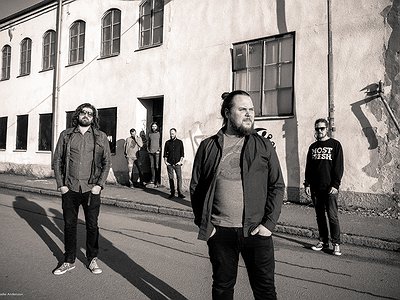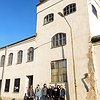Name: Rikard Sjöblom
Nationality: Swedish
Occupation: Vocalist / Composer
Selected Bands/Projects: Gungfly Beardfish
Current Release: On Her Journey to the Sun on InsideOut Music
Recommendations: I will go with a song by King Crimson that is based on a painting by Rembrandt. It’s called "The Nightwatch". In my understanding Rembrandts painting was covered in an oil coating that made it darken with age and that’s why it was posthumously named The Nightwatch. In the King Crimson song they paint such a nice picture of the actual people in the painting and of the artist painting them. They have given the people characters and they also sing about the painting going “…dark with age”. I love it and it’s probably my favourite song.
Contact/Website: If you enjoyed this interview with Gunfly, visit their Facebook profile for further information and current tour dates. Rikard Sjöblom also has his personal website.
When did you start writing/producing music - and what or who were your early passions and influences? What what is about music and/or sound that drew you to it?
I started playing accordion when I was just five or six years old, encouraged by my grandfather Lennart who played as well. I never really tried coming up with my own songs back then. It wasn’t until I started taking guitar lessons when I was ten years old that I figured out that you could do that, it just didn’t occur to me.
I think that I wanted to play guitar because I had discovered all these cool bands like Helloween, Iron Maiden and Metallica among others so I wanted to be able to play that type of music. So I took my first guitar lesson and I think I wrote my first song the same evening – still remember that I called it “The Girl Next Door”, ha ha! Coming up with songs of my own woke the urge to record them of course. I had this double deck cassette recorder that had a mic input so I used to put a tape in the recorder and play something, then I moved that tape to the other deck, played it and recorded the next part through the mic at the same time. This was usually cover songs, some Beatles tracks like “Don’t Let Me Down” and also Lennon’s “Mother” (I was a pretty dramatic kid) and I think I even sent a demo to a record label as a hopeful 10 year old. I’ve always enjoyed recording stuff on my own, even to this day, just because of the fact that you start with nothing and end up with a finished song (hopefully), anyway that’s what I’ve been doing since.
For most artists, originality is first preceded by a phase of learning and, often, emulating others. What was this like for you? How would you describe your own development as an artist and the transition towards your own voice? What is the the relationship between copying, learning and your own creativity?
Well, like I mentioned earlier I learned and recorded quite a lot of different songs by different artist as a kid and I had a pretty good ear for picking out songs and I’ve always sort of “naturally” known what the next chord is gonna be in a song (unless there’s a schizo writer of a weird prog song, maybe that’s why I started playing prog actually). I’ve picked up stuff from basically every artist I’ve ever admired and listened to and some artist have shone through more than others in my own songs. A big one early one in my career as a musician was King Crimson and there’s songs from the early Beardfish catalogue that sound like they could have been Crimson songs, same goes for Genesis and Gentle Giant actually.
I don’t think I’ve ever carbon-copied anything but I’ve come close with a song called “Abigail’s Question” with Beardfish where there’s a part that sound’s A LOT like “Inca Roads” by Frank Zappa. My influences have always varied depending on what I’ve been listening to at the moment which might not be to my benefit, but in one song it could be Elton John and in another Opeth or Mastodon …
What were your main compositional- and production-challenges in the beginning and how have they changed over time?
I was always too fast at settling with recordings both sound- and quality-wise in the beginning. Even if a riff or a solo or something wasn’t really there I would just shrug it off and get on to the next part. I did this with everything from vocals to drums and I can’t really listen to some of my early recordings, even stuff that’s been properly released, without thinking “man, I should have re-done that bit”. These days I tend to really let a part sink in before I record it and it’s for the better mostly. Sometimes the spontaneity adds something that ten hours of practise never can.
What was your first studio like? How and for what reasons has your set-up evolved over the years and what are currently some of the most important pieces of gear for you?
Oh man… my first studio wasn’t even a studio. This was in 1994, I was twelve years old and I had a intel 486 pc with FastTracker 2 where I recorded/programmed songs day in and day out. As time progressed I got new computers, better sound cards, better pre-amps, mics, well - gear in general actually. I’ve actually always managed to get along with whatever I had to work with at the time being and sometimes the limitations of the current set-up have been rewarding as well in terms of having to do things a certain way …
How do you make use of technology? In terms of the feedback mechanism between technology and creativity, what do humans excel at, what do machines excel at?
I couldn’t really tell actually because I mostly use the computer as a tape machine. I’m not really big at the whole slicin‘ n dicin‘, beat control, melodyne way of working. I like to re-do a part until I think it’s good enough for the album instead. And to be fair I have the oppurtunity to do so since I’m not on a clock in an expensive studio.
Production tools, from instruments to complex software environments, contribute to the compositional process. How does this manifest itself in your work? Can you describe the co-authorship between yourself and your tools?
It’s not until recent years that I’ve really taken a plunge into the modern way of working, because before that I’ve used portable studios and believe it or not I’ve actually rehearsed the songs with real musicians in the same room before entering the studio (It’s not that common these days …). These days I do a lot of my songs on my own in my home studio, where I start off with a guitar or a keyboard line and then gradually build from there. I also program, or rather play drums on the keyboard just to map a drum track out for either me or Petter Diamant (Gungfly) to play on the album recording later on. I’ve grown to really like this way of working recently and it feels pretty solid.
Collaborations can take on many forms. What role do they play in your approach and what are your preferred ways of engaging with other creatives through, for example, file sharing, jamming or just talking about ideas?
A perfect example of this would be for a song on the latest Big Big Train album where I started writing the song and actually mapped most of it out but left the vocal parts out, both lyrics and melodies and then David Longdon and Greg Spawton finished it. I love these types of collaborations.



